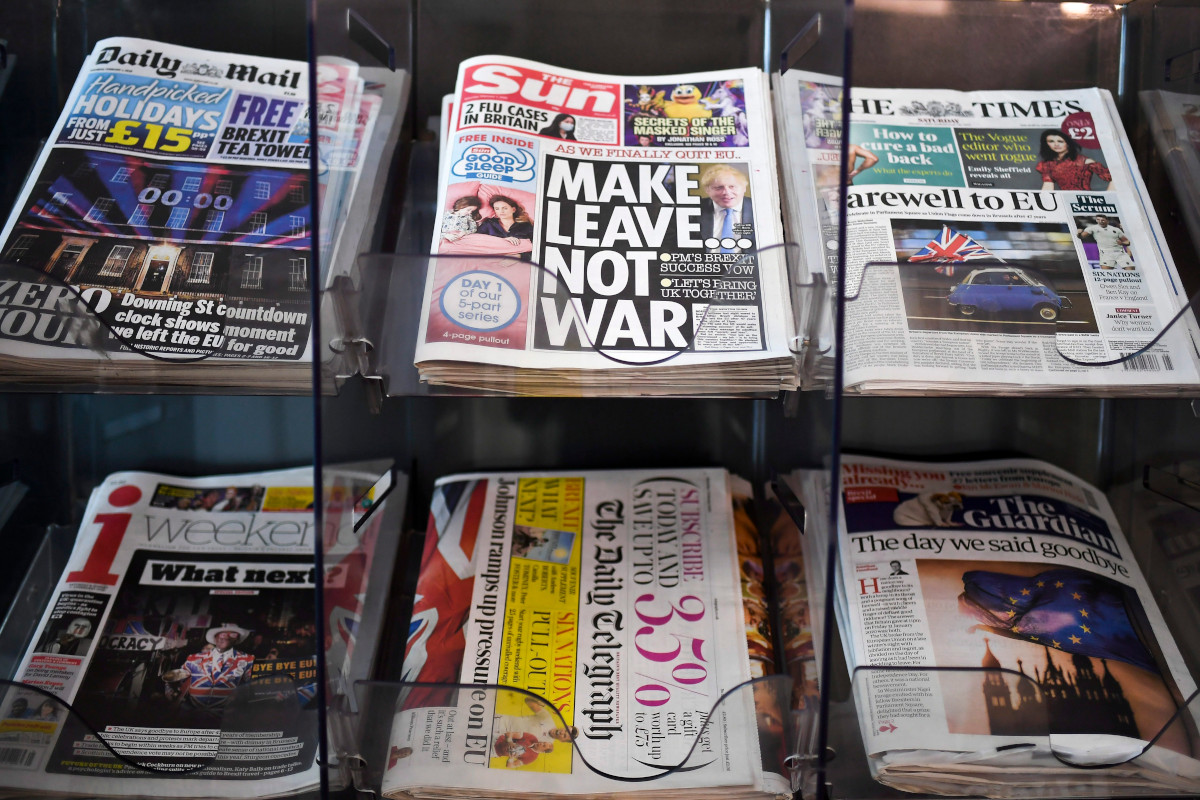The news media in Canada is in crisis. Policy responses to date are failing to solve for the information that citizens need to make informed decisions about important issues and debates. The Future of News series brings together leading practitioners, scholars, and thinkers to imagine new business models, policy responses, and journalistic content that can support a dynamic future for news in Canada.
The United Kingdom’s print media landscape is known for its lively, opinionated, and often deeply partisan publications. As long-standing legacy newspapers such as The Spectator, the Daily Mail, and The Telegraph jostle for attention, it can be difficult for new publications to break onto the scene. And yet, in the last few years, one upstart online-only publication has become a magnet for readers with an appetite for refreshing heterodox political and social commentary.
It’s called UnHerd. The name plays off of the idea that it is intentionally separating itself from the media pack. It claims its mission is, “[T]o push back against the herd mentality with new and bold thinking, and to provide a platform for otherwise unheard ideas, people and places.” That it wants to, “be bold enough to identify those things that have been lost, as well as gained, by the liberal world order of the past thirty years; but we strive to be always thoughtful rather than divisive.”
UnHerd was launched in 2017, as a response to what its founders saw as anti-Leave media bias in the deeply polarizing Brexit vote. It is owned by notable U.K. Conservative Party donor and one of the U.K.’s wealthiest hedge fund managers, Sir Paul Marshall. Not surprisingly, the site often publishes writings from right-wing political thinkers. But, what makes UnHerd unique today is its willingness to also entertain pitches from progressive thinkers from within and outside of the U.K.
“I think they’re among the best in the business from that perspective. You’ve got leftists, centre-leftists, and numerous right-wing commentators all publishing there,” says Oliver Bateman, a Pittsburgh-based weekly columnist for UnHerd who considers himself to be centre-left.
Bateman lauds UnHerd for its ability to attract talent from across the political spectrum. While celebrity right-of-centre journalists such as Douglas Murray have written for UnHerd, so too has Marxist philosopher Slavoj Žižek and literary critic Terry Eagleton.
“Recognizing this “all are welcome” approach, Allsides.com—a website that tracks the political bias of media publications—changed UnHerd’s classification from “Lean Right” to “Centre” in the summer of 2023.

A Brexit boost
Once written off by Vice as the “whining of the perfectly-well-represented,” UnHerd has seen its popularity skyrocket since its founding in the aftermath of the Brexit referendum—when many working-class, nominally left-wing voters pushed the “Yes” vote to a surprising victory.
Editor-in-chief Freddie Sayers joined UnHerd in 2019, the same year that the British Conservative Party, led by Brexiteer Boris Johnson, won a landslide victory in the general election. It was a contest in which many of the left-wing Labour Party’s safe seats, the so-called impenetrable “red wall”, flipped to the Conservatives. In the aftermath, pundits described it as a major realignment in British politics.
“The election of 2019 in which Boris Johnson won over here was a big moment for us,” says Sayers in an interview with The Hub. “It was thought of as a kind of change election, with new combinations of left- and right-wing ideas. And a shake-up of traditional political herds. We were really interested in that crossover, and we started to really grow quite fast during that period.”
Many British celebrities had vocally opposed Brexit and the Conservatives in the 2019 election. UnHerd’s writers were not shy about critiquing them for being out of touch.
One article ran under the headline “How Lefty luvvies lost the plot: The creative sector is now so woke and insular that it’s incapable even of recognising an oppositional voice.” Another was titled, “How I became ‘Tory scum’: The establishment’s reaction to the referendum result pushed me towards the Conservatives.”
Sayers himself is not shy about the fact that he voted “Remain” in the referendum, and he says UnHerd opposes dogmatically dividing people based on their voting preferences.
“That’s the space that we still try to inhabit. Which is to be questioning, skeptical, open always to the opposing argument, to ideas that might be dismissed as fringe at the time and eventually be shown to be worthy of being taken seriously,” he says.
Sayers says he believes a large part of the British population was questioning the dominant narratives within the U.K. UnHerd tapped into that and directly sought those people as their audience.
“The mood here in the U.K. became this binary of good people versus bad people—a really simplistic way of addressing big questions,” describes Sayers. “We definitely don’t like the idea that half the population is deplorable, or evil or anything. We don’t take it seriously.”
Still others say Sayers’ portrayal of the public is flawed.
“A common refrain in UnHerd’s writing is that we are going through a moment of ‘political realignment’, a time when labels of left and right are no longer helpful…because the left has abandoned workers for wokeness and the right are falling out of love with global free markets,” writes The Guardian’s Samuel Earle. “[That] it is now up to a coalition of the willing—made up mostly of conservatives and capitalists, but also a few disillusioned leftists—to stand up for the working class, tradition and common sense against ‘the establishment’, who almost always happen to be left-leaning. Hence UnHerd’s interest in including nominally leftwing—or, even better, formerly leftwing—voices: it proves that the old tribes no longer apply.”
Catering to the disaffected
Gavin Allen, a digital media lecturer at Cardiff University in Wales, says that UnHerd caters to a centre-right audience that has been underserved in the U.K. media market. This includes groups such as “Blue Labour,” who are more centrist members of the nominally left-wing Labour Party.
“UnHerd was formed in 2017, two years before the Conservatives purged [MP] Nicholas Soames and many of the centrists from the party,” says Allen. “We’ve also had the years of Jeremy Corbyn’s Labour opposition, which was much more socialist-style left-wing than Tony Blair’s version of Labour. These have been polarized times.”
Allen notes that these shifts within the U.K.’s two largest political parties have left many feeling politically homeless.
UnHerd’s strategy has been to cater to those people, including those who are skeptical, anti-establishment, and heterodox thinkers. It has focused on issues like politics, pandemic lockdowns, and pushback against identity politics. And it’s working. While polls show the governing Conservatives cratering in the next election, UnHerd is showing no signs of a disastrous collapse.
The publication gets more than two and a half times more online traffic than the New Statesman, which was founded prior to the First World War. UnHerd claims to reach almost 40 million users across all platforms in the U.K. and the U.S., with more than four million monthly page views, and more than 80 million hours of UnHerd content watched on YouTube.

Funded by big backers, subscribers, and a restaurant
Vice, which once derided UnHerd, filed for bankruptcy last year, fired hundreds of staff, and no longer publishes news on its own website. But UnHerd is going—and growing—strong.
“We launched the paid subscription less than three years ago, but it’s gone really, really well, and I’m happy with that progress,” Sayers says, noting that UnHerd has outperformed its expectations.
UnHerd’s coffers are also helped by the fact that its founder and publisher Sir Paul Marshall runs one of Europe’s largest hedge fund groups, Marshall Wace Asset Management. The one-time Liberal Democrat now Conservative and GB News donor has been with the outlet since its founding, when he offered UnHerd an endowment.
It may also be the only online-only publication that has gone into the restaurant business.
In 2022, UnHerd says it had made enough money from subscriptions that it was able to branch out. They opened a restaurant and club in the middle of London’s fashionable and expensive Westminster neighbourhood. Located inside the private member’s UnHerd Club, the Old Queen Street Cafe is a spot where anyone can gather to discuss and debate new ideas.
“We have all sorts of interesting people coming from around the world, and [the cafe] is always sold out,” says Sayers. “There’s no sense that you’re going to be censored or people are going to judge you, so I’m really proud of that, and that is now a big contributor to our bottom line.”
The promise and perils of online-only
Gavin Allen is interested in what it takes for online-only publications such as UnHerd to survive in today’s media landscape. He notes that while running a print publication comes with additional physical costs such as delivery, ink, and printers, online publications also have considerable expenses.
“A web publication needs more tech [and] product people, for example. While digital advertising revenues are much smaller than print advertising revenues, which is why some print products endure despite falling circulations,” says Allen.
Allen notes that the market for online news sites is international, and as such, it can be more difficult to make a name for yourself in the space without a specific niche.
“Whether it’s online or print, what you need more than ever is a necessary product with a definable audience,” he says. “If you have a niche, there are likely more people willing to pay you to service that [is a] special interest for them than there are people willing to pay for mass-market generalism.”
There’s also the fact that web audiences—which tend to skew younger than audiences for print publications—are generally less willing to pay for the products, such as magazines and newspapers, than older generations who bought as a matter of course. In this landscape, it can be a challenge for journalism outlets to build and maintain a legacy relationship with readers.
UnHerd columnist Oliver Bateman agrees with Allen’s assessment and admits to being pleasantly surprised by UnHerd’s success in the U.K. media market, which includes readers he believes are typically very loyal to their legacy newspapers.
“It’s a very different media ecosystem over there [in the U.K.], and the reading public—at least from my visits to the country—appears to have more of an appetite for news and commentary from their host of legacy publications,” he says.”UnHerd is the rare ‘new’ publication that has done well.”
The Future of News series is supported by The Hub’s foundation donors and Meta.
Recommended for You

Need to Know: Legacy media has a diversity problem

Brace for impact: something big is about to happen to the news in Canada

Stephen Staley: Squid Game was a warning to itself

‘There are consequences to this legislation’: Michael Geist on why the Canada-U.S. digital services tax dustup was a long time coming




